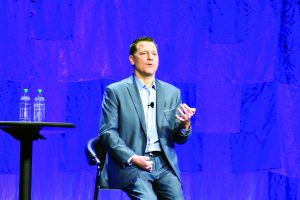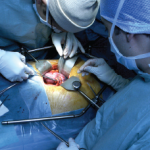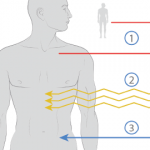CHICAGO—Welcome
“I am proud to be a rheumatologist and to be standing here before you as the ACR president. … It’s been a great life journey,” said David Daikh, MD, PhD, as he welcomed attendees to the 2018 ACR/ARHP Annual Meeting on Saturday afternoon, Oct. 20. Approximately 15,000 rheumatologists, rheumatology professionals and patients from the U.S. and around the world are in attendance.
Dr. Daikh reminded attendees of some of the ACR’s accomplishments from the past year. “The ACR supports science and innovation,” he said. He talked about the RISE registry, saying it was created by the ACR to help prepare rheumatologists for the significant challenges of a rapidly changing healthcare environment.
He also spoke about the longer term goals and accomplishments, saying, “The development of an effective advocacy effort has been one of the most important accomplishments of the past decade.” Visit the ACR’s Legislative Action Center to learn more.
Keynote
Following the presentation of the ACR and ARHP merit awards and awards of distinction, distinguished fellows and masters, Jonathan Koch, president and CCO of Asylum Entertainment LLC, a producer and director known for his work on The Kennedys, told his touching and inspiring story of mysterious illness, resilience and recovery.
In 2015, Mr. Koch, a busy executive and dad, rapidly developed a serious illness that led quickly to hospitalization in an intensive care unit.
Mr. Koch, who kept himself in good shape, never a smoker or a drinker, says he woke up one morning in his Los Angeles home not feeling well. He was experiencing flu-like symptoms, and his hands and feet were numb. He headed to the emergency department and was told there was nothing wrong with him, but he was given a shot of morphine to combat his symptoms. He was headed to an important meeting in Washington, D.C., that day, so he opted to stick to the plan.
In D.C. at the meeting, he started seeing triple, but he continued with his presentation. He said he “gave the presentation to the guy in the middle,” hoping that he was talking to the actual person.
As soon as he walked out of the meeting, he grabbed a cab and asked to be taken to the hospital. He wound up in the George Washington University Hospital Emergency Department, where he remembers the doctor telling him, “You’re probably going to die tonight. You should call your family.”
He sent a quick text to his then-girlfriend (now wife) of seven years, Jennifer Gunkel, but he made the conscious decision not to text his 15-year-old daughter, Ariana. He decided he couldn’t die because “she shouldn’t grow up without her daddy.” He said texting her would have been a decision made for him, not her.
“Fight for others,” he said, “not yourself.”
He recalled a time when Ariana was about 5-years-old when she was upset about something, and saying she “just can’t do it anymore.”
He found a stethoscope and let her listen to his heartbeat. He told her, “I never have to give up. I was born with the heart of a champion.” He then put the stethoscope on her chest and told her she was also born with the heart of a champion.
That attitude is what carried Mr. Koch through the next weeks and months. The puzzling and rare diagnosis: hemophagocytic lymphohistiocytosis.
While Mr. Koch’s initial therapy saved his life, he awoke from a medically induced coma with severe necrosis in his extremities. He required amputation of his hand and foot. In this presentation, he described the physical and emotional trauma he endured and shared his experiences in working with his healthcare team to restore his independence—including a hand transplant—and mobility so he could return to his career, dance with his daughter and even play tennis.
Ms. Gunkel was his true patient advocate, sitting by his bedside with a notepad and researching options, such as a hand transplant. His transplant surgeon told him, you have to be able to walk before we’ll even consider talking to you about a hand transplant. That served as the impetus for Mr. Koch to redouble his rehabilitation efforts. He walked into that surgeon’s office a few months later and said, “What’s next?”
Mr. Koch’s story illuminates the patient’s perspective on care, the pain and grief associated with illness, and the power of resilience to fuel recovery and restored independence. He knows the power of seeing failure and pivoting to success.
“It’s amazing to be here,” Mr. Koch said. “It’s amazing to be anywhere.”
Those in attendance at the opening session felt the same after listening to Mr. Koch. We were all happy to be there. Check out the trailer for a video of his story below:
Looking Forward
The Annual Meeting is sure to have a lot of moments like this in the coming days, along with exceptional education, networking opportunities and so much more. We hope you’re here in Chicago with us, but if not, stay tuned to our website for more updates from the Annual Meeting.
Keri Losavio is the editor of The Rheumatologist.



